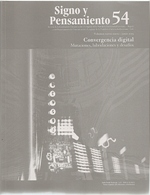Abstract
The emergence of interactive digital technologies has begun to affect discursive practices as solid as literature or creative writing. On the one hand, the circulation of commentary of literary works has become massive and even the license of the reader to intervene such texts is now open; on the other hand, the expression modes and base has been enhanced thanks to the creative use of recombination technologies, even if this means that the resulting products cannot be labelled as literary works and should therefore be placed within the realm of that emerging field where works based on digital interactive technology are now being assigned to, the so called net-art.
This journal is registered under a Creative Commons Attribution 4.0 International Public License. Thus, this work may be reproduced, distributed, and publicly shared in digital format, as long as the names of the authors and Pontificia Universidad Javeriana are acknowledged. Others are allowed to quote, adapt, transform, auto-archive, republish, and create based on this material, for any purpose (even commercial ones), provided the authorship is duly acknowledged, a link to the original work is provided, and it is specified if changes have been made. Pontificia Universidad Javeriana does not hold the rights of published works and the authors are solely responsible for the contents of their works; they keep the moral, intellectual, privacy, and publicity rights.
Approving the intervention of the work (review, copy-editing, translation, layout) and the following outreach, are granted through an use license and not through an assignment of rights. This means the journal and Pontificia Universidad Javeriana cannot be held responsible for any ethical malpractice by the authors. As a consequence of the protection granted by the use license, the journal is not required to publish recantations or modify information already published, unless the errata stems from the editorial management process. Publishing contents in this journal does not generate royalties for contributors.


